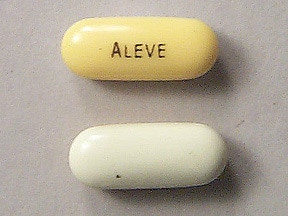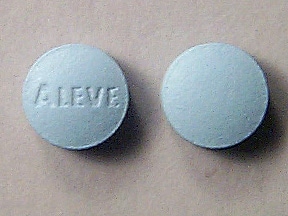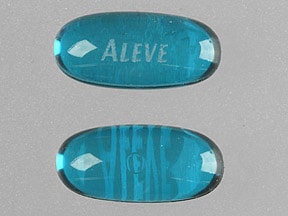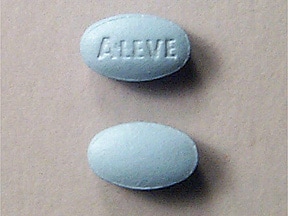What is Aleve?
Aleve is an over-the-counter (OTC) nonsteroidal anti-inflammatory drug (NSAID) used to:
- temporarily relieve minor aches and pains due to:
- minor pain of arthritis
- muscular aches
- backache
- menstrual cramps
- headache
- toothache
- the common cold
- temporarily reduce fever
Aleve is available as a tablet and as an oval, capsule-shaped tablet called a caplet.
What is the most important information I should know about Aleve?
Aleve can cause serious side effects including:
- Allergy reactions: Naproxen sodium may cause a severe allergic reaction, especially in people allergic to aspirin. Symptoms may include:
- hives
- facial swelling
- asthma (wheezing)
- shock
- skin reddening
- rash
- blisters
If an allergic reaction occurs, stop use and seek medical help right away.
- Stomach bleeding: This product contains an NSAID, which may cause severe stomach bleeding. The chance is higher if you:
- are age 60 or older
- have stomach ulcers or bleeding problems
- take a blood thinner (anticoagulant) or steroid drug
- take other drugs containing prescription or nonprescription NSAIDs (aspirin, ibuprofen, naproxen or others)
- have 3 or more alcoholic drinks every day while using this product
- take more or for a longer time than directed
- Heart attack and stroke: NSAID,s except aspirin, increase the risk of heart attack, heart failure and stroke. These can be fatal. The risk is higher if you use more than directed or for longer than directed.
Who should not take Aleve?
Do not use
- if you ever have had an allergic reaction to any other pain reliever/fever reducer
- right before or after heart surgery
What should I tell my healthcare provider before taking Aleve?
Before taking Aleve, tell your healthcare professional about all your medical conditions including if:
- you are at risk of stomach bleeding issues
- you have a history of stomach problems such as heartburn
- you have high blood pressure, heart disease, liver cirrhosis, kidney disease, asthma, or had a stroke
- you are taking a diuretic
- you have problems or serious side effects from taking pain relievers or fever reducers
Before taking Aleve, ask your doctor or pharmacist if Aleve is suitable for you, especially if you are:
- pregnant or breast-feeding. It is especially important not to use ibuprofen at 20 weeks or later in pregnancy unless specifically directed to do so by a doctor because it may cause problems in the unborn child or complications during delivery.
- under a doctor's care for any serious condition
- taking aspirin for heart attack or stroke, because naproxen may decrease this benefit of aspirin
- taking any other drug
How should I take Aleve?
- Do not take more Aleve than directed
- Take the smallest effective dose of Aleve
- Drink a full glass of water with each dose
- Take with food or milk if stomach upset occurs
- Adults and children: (12 years and older):
- take 1 tablet or caplet every 8 to 12 hours while symptoms last
- for the first dose you may take 2 tablets or caplets within the first hour
- do not exceed 2 tablets or caplets in any 8 to 12- hour period
- do not exceed 3 tablets or caplets in a 24- hour period
- Children under 12 years:
- ask your doctor for dosage information
- Stop use and ask your doctor if:
- pain gets worse or lasts for more than 10 days
- fever gets worse or lasts for more than 3 days
- you have difficulty swallowing
- it feels like the pill is stuck in your throat
- redness or swelling is present in the painful area
- any new symptoms appear
- In case of accidental overdose, get medical help or contact a Poison Control Center right away.
What are the possible side effects of Aleve?
Aleve may cause serious side effects including:
- Stomach bleeding. Stop use and ask your doctor if you experience any of the following signs of stomach bleeding:
- feel faint
- vomit blood
- have bloody or black stools
- have stomach pain that does not get better
- Heart problems or stoke. Stop use and ask your doctor if you have symptoms of heart problems or stroke:
- chest pain
- trouble breathing
- weakness in one part or side of body
- slurred speech
- leg swelling
These are not all the possible side effects of Aleve. Talk to your doctor or pharmacist about side effects, especially any that bother you or do not go away. If you have questions about Aleve you can call 1-800-395-0689 (Mon-Fri 9AM-5PM EST).
Aleve Images
How should I store Aleve?
- Store Aleve at 20-25ºC (68-77ºF).
- Avoid high humidity and excessive heat above 40ºC (104ºF).
Keep out of sight and reach of children.
What are the ingredients in Aleve?
Active ingredient: naproxen sodium
Inactive ingredients: FD&C blue #2 lake, hypromellose, magnesium stearate, microcrystalline cellulose, polyethylene glycol, povidone, talc, titanium dioxide.








